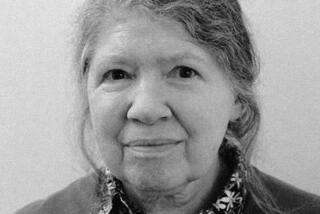Forgotten Treasures: A Symposium
- Share via
“Doctor Glas,” a short, astonishing novel by Hjalmar Soderberg, was first published in Sweden in 1905 and caused a scandal because of its handling of sex and death, not to mention abortion and euthanasia. The narrator is Doctor Glas, whose journal we read over his shoulder as he composes it. His is the unnervingly familiar voice we follow in its reflections, its lyrical praises or splenetic denunciations, its prevarications, its boredoms, its wistfulness. A romantic idealist afflicted with fin de siecle malaise, unable to fall in love except with women who love someone else, he offers both the candid transparency and the narcissism his surname suggests.
It’s no accident that his second name is Gabriel, for he’s tempted to play Angel of Life to a beautiful woman who begs for his help. Ignorant of the facts of marriage, she’s allowed herself to be pawned off on a “respectable” but loathsome clergyman. The help she wants from Glas is freedom from this troll’s sexual attentions, doubly repugnant because she’s having an affair with another man. Angels can of course be angels of death as well as of life, and doctors are conveniently situated for this role. The ensuing plot is a cunning triple-tied knot.
“Doctor Glas” is deeply unsettling, in the way certain dreams are--or certain films by Ingmar Bergman, who must have read it. It moves from the sordid to the banal to the anxiously surreal to the visionary, with economy and impressive style. A few years earlier and it would never have been published; a few years later, and it would have been dubbed a forerunner of stream-of-consciousness. It occurs on the cusp of our century, opening doors we’ve been opening ever since.
More to Read
Sign up for our Book Club newsletter
Get the latest news, events and more from the Los Angeles Times Book Club, and help us get L.A. reading and talking.
You may occasionally receive promotional content from the Los Angeles Times.







